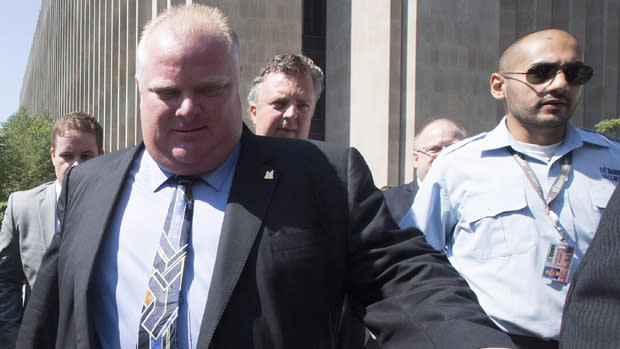4 possible outcomes in Rob Ford's conflict case

Toronto Mayor Rob Ford will learn Monday whether he will get turfed from office when an Ontario judge rules on whether Ford violated conflict of interest rules.
Ontario Superior Court Justice Charles T. Hackland will deliver his finding at 10 a.m. ET on Monday on a case that stemmed from a complaint against Ford lodged by Toronto resident Paul Magder.
Magder, who is being represented by Toronto lawyer Clayton Ruby, argues Ford violated the Municipal Conflict of Interest Act when he spoke and participated in a council vote regarding a financial penalty he was ordered to pay in relation to donations he solicited for his football charity.
The vote on Feb. 7 rescinded an August 2010 directive from council and integrity commissioner Janet Leiper that the mayor pay back $3,150 in donations that corporate and lobbyist donors had given the Rob Ford Football Foundation when he was a city councillor.
Leiper found in 2010 that Ford had violated council's code of conduct when he used city letterhead to solicit donations for the foundation and recommended he pay the money back out of his own pocket.
Council adopted the commissioner's findings and sanction in a resolution Ford voted against — but he never made the repayments, despite several reminders from the commissioner.
Listed below are four possible scenarios that could play out when Justice Hackland delivers his findings Monday.
1.)Judge finds Ford was in a conflict of interest and violated the terms of the conflict of interest act.
Consequences: Ford is automatically removed from office. The judge could also bar him from seeking office for up to seven years. The judge could also choose not to put any restrictions on Ford seeking office in the future.
Ford can appeal the decision, but he would have to apply for a stay of the decision in order to remain mayor, says John Mascarin, a municipal and land use planning specialist at law firm Aird and Berlis LLP.
If successful, he would remain until a three-judge panel at an Ontario divisional court hears the appeal. The divisional court can either uphold the finding, replace it with its own finding or order a new hearing altogether.
If ultimately, after the judicial process is completed, Ford is ordered from office, council has two options on how to replace him. After voting to formally vacate his seat, council would then vote to either appoint a new mayor until the next municipal election or call a byelection for the office of mayor.
If council chooses to appoint a mayor, the appointee need not necessarily be a member of council.
If Ford has not been barred from seeking office after being removed as mayor, he could run in the byelection and again in the subsequent municipal election.
All the power and duties of the mayor's office while vacant would be conferred on Deputy Mayor Doug Holyday.
2.) Judge finds Ford was in a conflict of interest, but acted through inadvertence or an error in judgment.
Consequences: Ford, who said in court he had never read the Municipal Conflict of Interest Act, remains as mayor, but may be ordered to pay back some or all of the money that he solicited on behalf of his charity. He would face no other sanctions. Ford also has the option to appeal a restitution order, if one is made, to a divisional court.
3.) The judge finds Ford was in a conflict of interest, but determines the amount of money involved is so small that it does not trigger the conflict provisions.
Consequences: Ford remains as mayor and faces no other sanctions.
4.) The judge finds Ford's actions did not constitute a conflict of interest.
Consequences: Ford faces no sanctions, legal or otherwise. The judge could, for instance, find that Ford had the right under law to speak in his own defence at the council meeting. Ford's legal team has argued that the Municipal Conflict of Interest Act does not apply in this case; rather the matter centres on Leiper's finding that he violated council's code of conduct.

